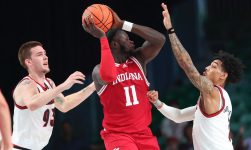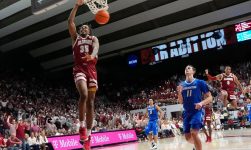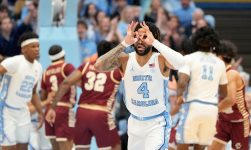Significant changes are coming to the men’s college basketball calendar.
The NCAA Division I Council met this week to approve a litany of NCAA-wide legislative changes, all of which are scheduled to take effect in January 2024. Those changes range from elevating requirements to apply to be a Division I institution, to updating punishments for college athletes who gamble, to new protections and protocols for name, image and likeness endeavors.
In college basketball, the most pertinent reforms pertained to major makeover of the recruiting calendar as well as changing the transfer portal window.
Calendar overhaul coming in 2024
In July, CBS Sports reported on a proposed recruiting calendar that was significantly updated for the transfer portal era. The calendar received near-universal support and was the endeavor of Baylor coach Scott Drew. After previous endorsement from the men’s basketball oversight committee, sources told CBS Sports that the D-I Council on Wednesday approved the majority of that calendar (with some minor tweaks to be made official soon).
April will no longer have an evaluation period for college coaches to scout high school prospects. Because there are so many transfers in the modern game, that month is now being prioritized by coaches to reestablish their rosters and use their recruiting time to either host transfers or fly to visit them in their home areas. It’s a major change, but a necessary one, according to coaches and support staff.
In May, there will be one non-scholastic recruiting weekend in addition to an elongated dead period that will not permit coaches or recruits to see each other. What’s more, holidays such as Mother’s Day, Father’s Day, Juneteenth and the Fourth of July will also be dead days.
In June, sources said, two scholastic recruiting weekends were likely to remain instead of a proposed consecutive five-day period. This, per one source, is because the National Federation of State High School Associations has pushed back on streamlining June recruiting.
What’s more, the NCAA Basketball Academy will be back in 2024 as well, and will again be held in July, sources said. Location is to-be-determined. After some skepticism over whether it would continue, it was well-run and well-received in Memphis this past summer. The cost is north of $7 million, according to sources, but the NCAA still wants to be involved in an official capacity in college basketball recruiting. It’s currently viewed by many as a benefit to mid-major schools more than power-conference programs. The Academy debuted in 2019, then went on a four-year hiatus due to impact from the pandemic. July will continue to have another weekend — early in the month, it’s most high-profile recruiting weekend — for non-scholastic recruiting. (Nike Peach Jam, Adidas 3SSB Championships, Under Armour Association championship, etc.)
In August, a two-week-long dead period will be introduced. What isn’t on the calendar: a true “blackout” period wherein coaches and recruits are prohibited from having any contact whatsoever. Despite many coaches lobbying for this — in an effort to have a true reprieve from the job at some point in the offseason — it still needs at least another year’s worth of discussions before it can be brought to a vote.
Portal window goes from 60 to 45 days
It was long expected that college basketball’s window to enter the transfer portal would shrink from a 60-day timeline to 30. And up until the start of the D-I Council meetings, that was the anticipation from college basketball’s stakeholders. Instead, it will be 45 days and — at the objection of many in college basketball — the portal will again open the day after Selection Sunday.
The decision arrives with controversy. Critics of the date say it comes at a time when attention should be on the sport’s biggest event — and not diverted by hundreds of players hopping into the portal as people are filling out brackets and gearing up for March Madness.
The Division I Council is made up of dozens of representatives from across the country (and all 32 D-I leagues), nearly all of whom work in college athletics. One source said the proposal and hope was for college basketball to have a 30-day window that opened the Monday after the first weekend of the NCAA Tournament.
Neither of those happened for two reasons, sources told CBS Sports.
One: New NCAA president Charlie Baker let it be known from the outset that he was in favor of a 45-day window. The other was the Student-Athlete Advisory Committee representatives pushed for 45 days. The men’s basketball oversight committee had done its research and found men’s and women’s basketball players were in favor of 30 days, but those talking points were ultimately shot down after “significant arguments” were voiced in favor of 30 days.
“We had every argument for 30 days,” one source in favor of the 30-day window told CBS Sports. “Men’s basketball was against [45]. … The men’s basketball student-athlete engagement group favored a 30-day window after the second round.”
Why a universal 45-day timeline for all sports instead of allowing certain sports to determine what’s best? That is a question still lingering in NCAA administrative circles. Men’s basketball is a part of a “pilot program” right now that theoretically could allow it to relitigate the issue, but it would ultimately still have to be approved by the D-I Council, and on a hasty timeline, so no 11th-hour push is anticipated.
“In both men’s and women’s basketball, the council determined that a 45-day window that concludes on or before May 1 best enables coaches to understand their current rosters, provides stability for student-athletes remaining at the school as they prepare for summer basketball and encourages student-athletes who intend to transfer to do so before final exams at their current schools and summer school application deadlines at most campuses,” Lynda Tealer, chair of the council and deputy athletics director at Florida, said in a release.
The 45-day timeline will be in effect for next spring. The issue is expected to be debated again in the summer and fall of 2024.






